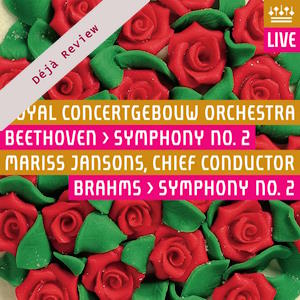
Déjà Review: this review was first published in June 2005 and the recording is still available.
Ludwig van Beethoven (1770-1827)
Symphony No 2 in D major, Op. 36 (1801-2)
Johannes Brahms (1833-1897)
Symphony No 2 in D major, Op. 73 (1877)
Royal Concertgebouw Orchestra/Mariss Jansons
rec. live, 27-28 October 2004, Concertgebouw, Amsterdam. DSD
RCO Live RCO05002 [72]
In my June Reviewer’s Log I mentioned a superb concert I had attended. It was conducted by Mariss Jansons. I said that a live recording of one of the works played in that concert, Brahms’s Second Symphony, was on the way and here it is.
The recordings here were taken from two consecutive concerts. I don’t know how much editing went on and to what extent the recording of each symphony represents a conflation of the two separate performances. All I can say is that both sound as if they were set down in a single “take”. From my own experience I know that Jansons is more than capable of turning in a compelling and flawless performance of the Brahms symphony without any resort to editing.
The Beethoven is a “big band” performance but though it has body and weight it’s by no means heavy. In the slow introduction to the first movement every dynamic and accent is precisely, but never pedantically, observed. Indeed, this fidelity to the score is a notable feature of both performances. The Allegro con brio swirls away at the start and is very exciting. The exposition repeat is properly observed and the entire reading has tremendous energy, bite and precision.
The slow movement is taken at a fairly stately pace. The music is affectionately shaped and the Concertgebouw winds distinguish themselves. Once again the dynamic gradations are scrupulously observed but, though every point of detail is given its proper place, everything sounds spontaneous and relaxed. The scherzo crackles with energy while the perky finale is given an exuberant reading, full of joy, and the playing has pinpoint accuracy.
In summary, this Beethoven Second is one of the most enjoyable and refreshing I’ve heard in years. It’s a truly bracing performance, packed with verve and good humour. One interesting point is that so far as I can tell Jansons divides his violins left and right in this work whereas in the Brahms he doesn’t do so. This is a justifiable decision, I think, since there is less antiphonal violin writing in the Brahms. Also, positioning the strings in what has become the conventional way in the Brahms, with the celli on his right allows them to sing out their many crucial lines more vividly.
If the Beethoven performance was excellent the Brahms is even better. The first movement is warmly phrased but there’s never a hint of romantic wallowing. Instead the music constantly has forward momentum. Like a number of other conductors Jansons omits the exposition repeat, which I regret. As the development unfolds the playing has power and delicacy by turns, according to the demands of the score. The passages marked forte and above blaze forth thrillingly but there is never even a suggestion that the loud dynamics are being forced. Instead the RCO’s tone is at all times rich and full. The same attention to detail that was apparent throughout the Beethoven characterises this performance also. One of my favourite passages in this work is the horn solo just after cue M in the score, which paves the way for the coda. This is done quite beautifully (track 5, from 12’56″), after which the movement skips gently to its close.
The glorious reading of the slow movement is etched in rich colours of gold and brown at the start. The passage from cue C (track 6, 4’15″) to just before E is really fervent before tranquillity is restored. Even when the music sounds gentle one is conscious of stronger undercurrents beneath the surface. Jansons is masterly in this movement, letting Brahms’s argument unfold in a seamless flow.
The third movement begins at an easeful pace but when the various presto sections occur the music is wonderfully athletic and light on its feet thanks to the virtuosity of the Dutch players. The finale crowns the whole interpretation, as it should. Jansons gives it a tumultuous reading without ever making the music sound coarse or overdriven. There’s a splendid energy, even when the music relaxes into one of the largamente sections. The whole movement is tremendously exciting and when the exultant coda is reached there’s an almost tangible sense of release. The coda is truly stirring; the only problem is you don’t want the performance to end. But end it must and at the close Jansons and his players are rewarded with an enthusiastic ovation, which is richly deserved. Applause is retained at the end of both works and I think that’s entirely right and proper, reminding us that we’ve been hearing live performances rather than edited studio recordings.
A few days ago a very musical friend and I were discussing the demise of the late and much-lamented Carlo Maria Giulini. We were both of the opinion that his passing marked the end of an era and that there were very few conductors left whose stature is comparable. Indeed, we could only come up with two names. One was Claudio Abbado; the other was Mariss Jansons. I suggest that anyone hearing this CD will agree that Jansons is a truly exceptional conductor. His feeling for the music, his thorough preparation, his ability to inspire his players and his evident rapport with them combine to make these performances something very special.
This is one of the finest orchestral discs to have come my way for a very long time. Listening to it is a thrilling experience and I commend it with the greatest possible enthusiasm.
John Quinn
Buying this recording via a link below generates revenue for MWI, which helps the site remain free



















